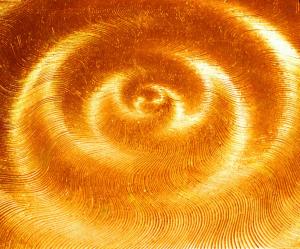 In the Divine Names, Dionysius explained how power is often used as a name for God. In the Mystical Theology, he indicated that power is not properly attributed to God himself in any absolute sense by saying God neither has power, nor is power.
In the Divine Names, Dionysius explained how power is often used as a name for God. In the Mystical Theology, he indicated that power is not properly attributed to God himself in any absolute sense by saying God neither has power, nor is power.
Power can be designated as attribute or energy of God, which is why it can be conventionally predicated to God because it is how we come to know him in his activity towards us. Kataphatic theology embraces God in accordance to what is revealed and the concepts which develop out of that revelation. Nonetheless, kataphatic theology often represents this by establishing an apophatic aspect to the conventions, which is exactly what Dionysius did in his Divine Names:
We say, then, that Almighty God is Power, as pre-having, and super-having, every power in Himself, and as Author of every power, and producing everything as beseems a Power inflexible and unencompassed, and as being Author of the very existence of power, either the universal or particular, and as boundless in power, not only by the production of all power, but by being above all, even the self-existent Power, and by His superior power, and by His bringing into existence, ad infinitum, endless powers other than the existing powers; and by the fact that the endless powers, even when brought into existence without end, are not able to blunt the super-endless production of His power-making power; and by the unutterable and unknown, and inconceivable nature of His all-surpassing power, which, through abundance of the powerful, gives power even to weakness, and holds together and preserves the remotest of its echoes; as also we may see even with regard to the powerful insensible perception, that the super-brilliant lights reach even to obscure visions, and they say, that the loud sounds enter even into ears which are not very well adapted to the reception of sounds. For that which does not hear at all is not hearing; and that which does not see at all is not sight.[1]
God is said to be power because he is the source of power while he transcends in himself any concepts which we have of power itself. He establishes the existence of power, and the varieties of potency in every category and gradation of being. Everything which comes to exist has a potential or potency given unto it for it to establish itself in the realm of being. God, because he does not come to be, because he is not some being like any other being, is not said to possess such potentiality which limits him and his ability to act as he wills.
God, as he is in himself, transcends our relative engagement with him. There is a sense of power in relation to that economic activity because in and through it he limits himself and makes room for us to act and react to him. We sense God in and through the power contained in his economic activity and so we label that power God and come to know God through such power. As we do so, we consider power as one of the names or attributes of God. But as we come to know him we know he is beyond what we encounter, that he infinitely transcends what we experience, leading is to realize that his actions truly relate to him but do not limit him and who he is and so are to be denied as representing who he is in himself.
To say God is not power must not be used to suggest that God therefore possesses power from some external source. Anastasius, using virtūs to translate the word for power, indicated in his scholia that, “The divine nature is, of course, sufficient in itself for possession of virtue. No virtue befalls it, since the simplest virtue and more than virtue subsists in it, and it is the font of all virtues.”[2] God does not possess power as some secondary quality which he receives from somewhere else as if it were something which he could lose. Power comes from him, from within him, in his creative activity. As we engage such power, as we embrace it in ourselves, we then can be said to be participating in the divine life, not because we join in his transcendent nature, but because we join ourselves with his activity. But, we must be careful. In saying we join in with him through such power, we must not think of it as if we are accumulating magic power which we then control; God is not a power, not something which we can dominate and control and use for our own private desires. God rather acts with us, allowing us to join our activity with his, to make our life centered upon him instead of ourselves.
It is important to note how Dionysius affirmed that power can be a name for God through kataphatic theology: he affirmed it on the basis of a transcendent apophatic foundation when he wrote that God is, “boundless in power, not only by the production of all power, but by being above all, even the self-existent Power.” Dionysius explained that God is called power because he established power in his creation, showing himself to be powerful in his actions while being above power in himself. There is to be a unity between kataphatic and apophatic theology: they are both point to and demonstrate the one truth of God. Both are true so long as they are properly understood. Kataphatic theology quickly can become false if the apophatic denial of the conventions is not acknowledged, and apophatic theology is false if it is read nihilistically. Kataphatic affirmations can be seen as special forms of negations as they deny what is less than what such conventional nomenclature suggests for God, while apophatic negations can be seen as transcendent affirmations, affirming that God is always greater than what our concepts suggest. That is, to say God is power, or possesses power, is to affirm the power of his action over any nihilistic denial of God which would suggest he is intrinsically weak or powerless, while to say God is not power, nor possesses power, is to put him beyond power and the limits contained within the concept of power itself. The apophatic journey starts with what is given to us by kataphatic theology, sees where kataphatic theology is pointing, and takes us further, so that what is used to affirm God is denied for the sake of letting God be God. To read apophatic denials in any other way can easily become a nihilism which leads not to God but the nihilistic denial of God himself, which is as far from what is intended as can be. We start, therefore, with attributing power to God, but then we see God transcends such power, making us realize it is more correct to say God is not power nor possesses power, though with the caveat that we take it in relation with the affirmation which we started with so as to see God as transcending such power because he is its source and foundation and not because it is something other than God which exists independent from God himself.
[IMG=Photo of Light [Public Domain] from pxhere ]
[1] Dionysius, Divine Names. Trans. James Parker (London: James Parker and Co,, 1897), 94-95.
[2] A Thirteenth-Century Textbook of Mystical Theology at the University of Paris. trans. L Michael Harrington (Paris: Peeters, 2004), 101.
Stay in touch! Like A Little Bit of Nothing on Facebook













